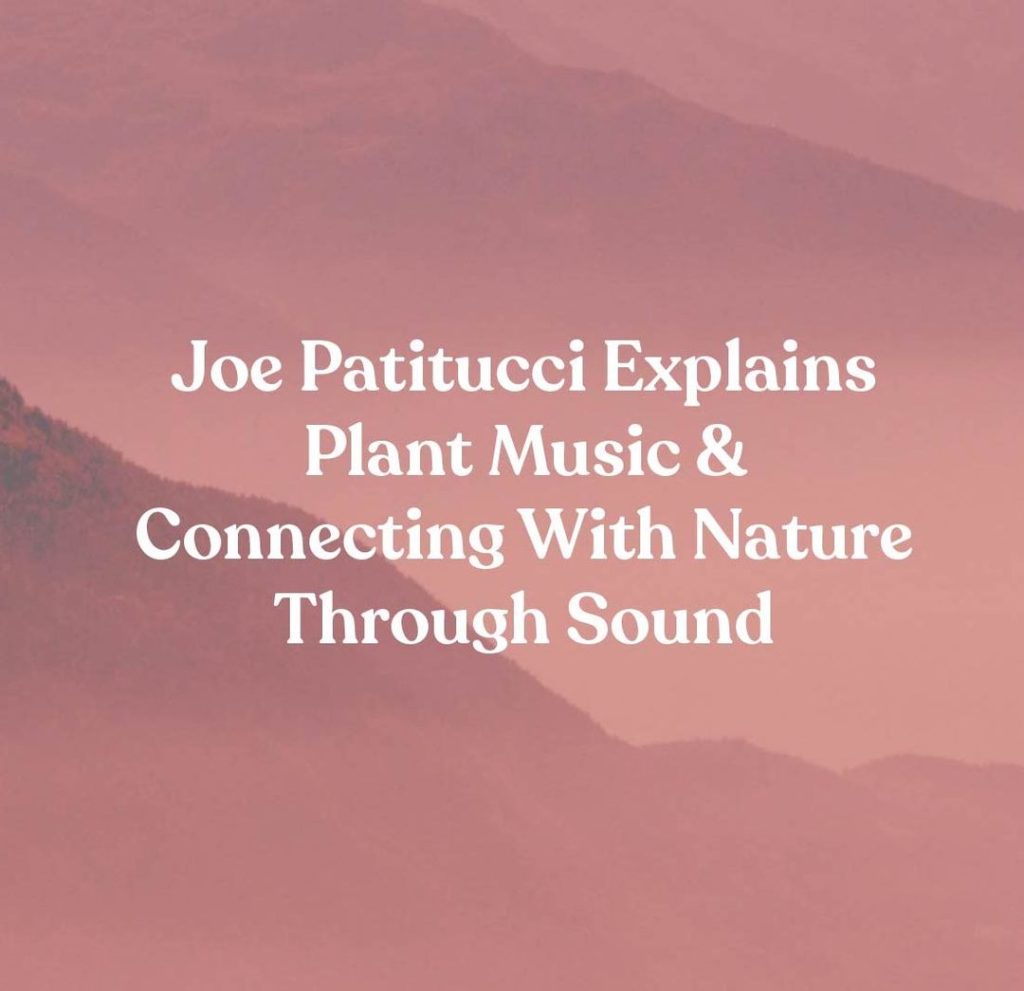
Getting in touch with our senses is one of the most enjoyable aspects of psychedelic experiences.
The synesthesia they produce reminds us of how much more texture, color, and life there is to our lives than we ordinarily accept. In our fast-moving, chaotic, busy world, we’ve disconnected from our senses, our intuitions, and even our bodies – fundamental aspects of the human experience.
So, can we reclaim these lost senses and unlock new levels of joy and happiness?
Joe Patitucci is an artist, CEO of Data Garden, and inventor of PlantWave, a device that translates real-time data from living plants into music, creating harmonious sound environments powered by nature.
Joe believes that creating and listening to plant music allows people to see the world in a new way, to help them reconnect to those senses, connect to their hearts, breath, bodies, and nature.
In his view, tuning into the subtlety of plant music is a stochastic phenomenon, like lying under a tree and watching light beams through the leaves. It benefits the brain and helps us relax. In Joe’s words:
“As we get to know ourselves more deeply through digital technology, I believe we can use sound to heighten our experience of subtle senses, intuitions, and feelings.” – Joe Patitucci.
Plant music, then, is not only able to parallel some aspects of the psychedelic experience, but Joe believes this musical endeavor wouldn’t even exist without the creative breakthroughs he had as a result of psychedelic experiences.
So, how exactly does the process of creating plant music work?
Joe became interested in creating plant music after learning about the experiments some people were conducting with plants in the 70s. The experimenters hooked lie detectors to plants in an attempt to discover whether plants have some type of consciousness.
The results were pretty surprising: the plants would respond whenever something happened in the room, and a wave change would occur. Whether these results prove the existence of consciousness or awareness in plants is still debatable.
However, we now know that plants communicate with each other and respond to their environment. They are living, breathing, feeling beings from which we still have much to learn.
At this point, it’s worth clarifying that PlantWave doesn’t extract some ‘hidden’ music already existing within plants. It’s not about amplifying plants’ natural sounds but about leveraging subtle electrical variations in the plant’s leaves to create sound.
In other words, you are taking that electrical wave, translating it into pitch, and then routing the pitch messages to different instruments. Music composed this way can last hours, days, or even weeks, also known as ‘generative music,’ pioneered by the famous composer and producer Brian Eno.
Of course, there’s some involvement on the composer’s side in terms of design and orchestration. It’s essential to represent the data harmoniously because that will allow humans to spend time listening to the plant over a long period of time.
Plants function at much longer timescales than our own, so if you water a plant while listening to it, the music might not be affected for hours. However, PlantWave also effectively functions as a monitoring system where, by listening, you can get a sense of the activity level of the plant.
One way Joe achieves that is by having multiple musical instruments triggered by the same data – each instrument represents the same data at a different resolution. This way, you can get a sense of the plant’s activity level.
Another fascinating aspect of PlantWave is the wide range of results you can get by experimenting with different plants in different spaces and scenarios. There are no wrong answers!
Do you want to learn more about PlantWave, plant consciousness, and the future of biofeedback?
Make sure to catch this week’s episode of ‘The Field Tripping Podcast‘
Joe joins Ronan to discuss how he combines nature and the use of emerging technologies to extend human perception into subtle realms of reality. Tune in to find out more!
Joe also shares his views on plant consciousness, his experiences with psychedelics, the future of biofeedback, and more.
Key Takeaways
- Joe Patitucci explains plant music and biofeedback (00:00)
- What perceptions have we lost over time? (02:08)
- How to avoid becoming numb to today’s constant state of emergency (08:44)
- Where did the idea of plant consciousness come from? (23:14)
- How to get plants to respond to the sounds you make (38:26)
- What was it like working with plants in the beginning? (57:54)
- The power of love and the power of physical affection (1:04:59)
- What’s the future of biofeedback? (1:11:13)
Additional Resources
Find out more about PlantWave at: https://www.plantwave.com/
Leverage the power of psychedelic therapy and start your path to long-term change. Learn more at: https://www.fieldtriphealth.ca/
Download the Field Trip App:https://www.fieldtriphealth.com/self-guided-mobile-app
Tune in to The Field Tripping podcast at: https://www.fieldtriphealth.com/podcast